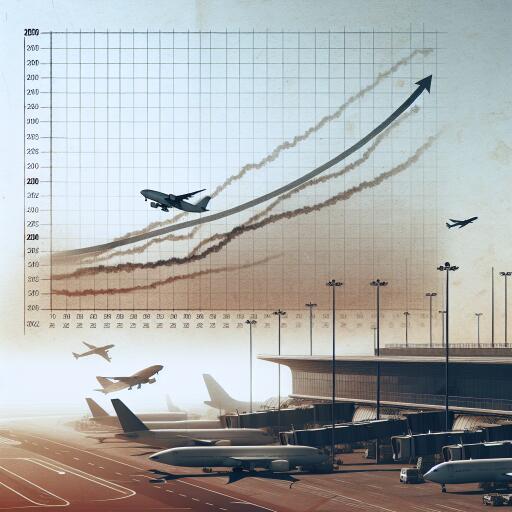Study: Aviation emissions soar back towards pre-pandemic levels
According to a recent report by the think tank Transport & Environment (T&E), emissions from UK flights have witnessed a significant uptick, aligning closely with pre-pandemic figures. Emissions surged by 23 percent from the previous year, bringing the pollution levels to 89 percent of what was recorded in 2019, before the global impact of the coronavirus pandemic.
The analysis revealed that the number of flights originating from UK airports escalated to nearly 940,000, marking a 16 percent increase last year. Concurrently, carbon emissions from these flights rose to 32 million tonnes. This resurgence in aviation activity indicates that the UK is on a trajectory towards reaching, if not surpassing, the flight frequency and associated CO2 emissions witnessed in 2019.
This increase poses considerable challenges to the aspirations of retaining aviation-related pollution to the 2019 threshold, as outlined in the UK’s Jet Zero Strategy. The strategy aims to foster a net-zero emission aviation sector by 2050, advocating for never again breaching the pollution levels of 2019.
Further scrutiny within the report shows a rise in emissions across all flight categories. Domestic flights saw a 16 percent increase in emissions, European flights were up by 13 percent, and long-haul flights reported a 28 percent surge. T&E has expressed concerns that, should this trend persist, aviation emissions may hit an unprecedented peak by 2024.
Highlighting the significant contributors to this escalation, the report points towards budget airlines. For instance, although British Airways remains the top emitter with 7.52 million tonnes of CO2 in 2023, which still falls below their 2019 levels, budget airlines like Ryanair, easyJet, and Jet2.com have increased their emissions by 13.5 percent, 4.8 percent, and 26.3 percent, respectively, surpassing their 2019 figures. This suggests budget carriers are key drivers in the rebounding emissions.
The UK’s reluctance to implement policies that could dampen demand for aviation is criticized, with the current preference leaning towards fostering new technologies and alternative fuels. However, existing regulatory frameworks, such as the UK emissions trading scheme, have been noted to offer airlines considerable leeway, with aviation fuel and tickets exempt from VAT or fuel duty.
Matt Finch, UK policy manager at T&E, criticized the UK’s approach to aviation emissions, contrasting the government’s stance with its treatment of road transport emissions, where drivers are taxed through fuel duty. Finch asserts, “UK aviation is addicted to pollution,” urging for policy reform to hold airlines accountable for their escalating climate impacts.
This analysis is part of a broader examination by T&E, extending its scrutiny to Europe-wide aviation emissions, uncovering similar patterns across the continent. Jo Dardenne, Aviation Director at T&E, noted, “The low-cost business model is driving unsustainable growth in the sector,” emphasizing that optimistic expectations for a ‘green recovery’ in aviation have been overshadowed by the sharp rise in pollution levels spurred by budget airlines.
Despite claims from budget carriers regarding their fuel efficiency and the sector’s commitment to sustainable fuels and developing new low and zero-emission aircraft, T&E argues that only policies aimed at reducing demand for flights will enable governments to achieve their emission reduction goals.
In closing, Dardenne highlights the disparity in the cost of flying versus its environmental impact, advocating for a reevaluation of the aviation sector’s contributions to carbon emissions. The current inadequacy of carbon pricing for aviation, she argues, perpetuates an “absurd situation” where the environmental costs of flying are vastly underpriced, calling for an end to this imbalance to support a move away from fossil-fuel-dependent aviation.
